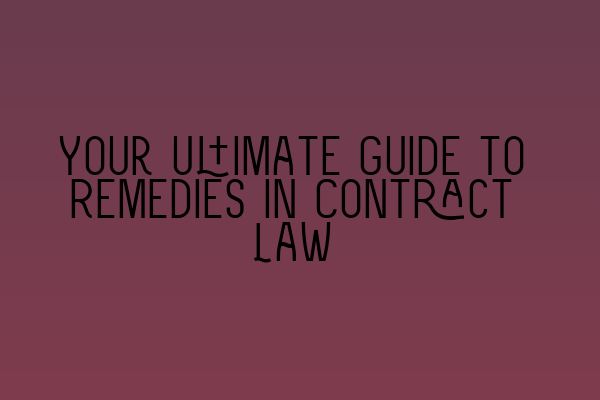Your Ultimate Guide to Remedies in Contract Law
When entering into a contract, both parties expect that the terms will be fulfilled as agreed upon. However, there are instances where one party fails to meet their obligations, leading to a breach of contract. In such cases, the innocent party may seek remedies, which are legal solutions designed to compensate for the loss caused by the breach.
In this ultimate guide to remedies in contract law, we will explore the different types of remedies available and the factors to consider when seeking them.
1. Specific Performance
Specific performance is a remedy whereby the court orders the breaching party to fulfill their contractual obligations as originally agreed upon. This remedy is often sought in situations where monetary compensation would not adequately remedy the breach. For example, if a unique piece of artwork was promised to a buyer, specific performance could be sought to ensure the artwork is delivered.
2. Damages
Damages are the most common remedy sought in contract law. They are designed to compensate the innocent party for the loss suffered due to the breach. There are two main types of damages: expectation damages and reliance damages.
a. Expectation damages aim to put the innocent party in the position they would have been in if the contract had been performed. This includes compensating for any financial losses incurred as a direct result of the breach. It is important to note that damages cannot exceed the amount that would reasonably compensate the innocent party.
b. Reliance damages, on the other hand, aim to put the innocent party in the position they were in before entering into the contract. This includes compensating for any expenses incurred in preparation for the contract that are wasted due to the breach.
3. Rescission and Restitution
Rescission is a remedy that allows the innocent party to cancel the contract and be released from any future obligations. This is often sought in situations where the breach has fundamentally undermined the purpose of the contract. Restitution refers to returning any benefits received under the contract. For example, if a buyer rescinds a contract to purchase a defective product, they may be entitled to a refund of the purchase price.
4. Injunctions
An injunction is a remedy sought to prevent the breaching party from taking certain actions or to compel them to perform specific actions. This remedy is often used when specific performance is not feasible or when monetary compensation cannot adequately remedy the breach. For example, if a party is using confidential information obtained in breach of a non-disclosure agreement, an injunction may be sought to prevent further disclosure.
5. Quantum Meruit
Quantum meruit is a Latin term meaning “as much as is deserved.” This remedy allows the innocent party to recover a reasonable sum for the value of the work or services provided before the breach occurred. It is often sought when there is no valid contract or when the original contract has been frustrated or rendered impossible to perform.
When considering which remedy to seek, several factors must be taken into account. These factors include the nature of the breach, the extent of the loss suffered, the availability of alternative remedies, and the feasibility of enforcing a particular remedy. It is crucial to seek legal advice to determine the most appropriate remedy in your unique circumstances.
In conclusion, remedies in contract law are an essential aspect of protecting the rights and interests of parties involved in a contract. Whether seeking specific performance, damages, rescission and restitution, injunctions, or quantum meruit, it is important to understand the available options and seek professional legal guidance.
For further information on SQE exams and preparation courses, check out these related articles:
– SQE 1 Practice Exam Questions
– SQE 1 Practice Mocks FLK1 FLK2
– SQE 2 Preparation Courses
– SQE 1 Preparation Courses
– SRA SQE Exam Dates
Remember, understanding remedies in contract law can empower you to navigate contractual disputes with confidence and assert your rights effectively.
